| Reviews & Columns |
|
Reviews DVD TV on DVD Blu-ray 4K UHD International DVDs In Theaters Reviews by Studio Video Games Features Collector Series DVDs Easter Egg Database Interviews DVD Talk Radio Feature Articles Columns Anime Talk DVD Savant Horror DVDs The M.O.D. Squad Art House HD Talk Silent DVD
|
DVD Talk Forum |
|
|
| Resources |
|
DVD Price Search Customer Service #'s RCE Info Links |
|
Columns
|
|
|
Flaw, The
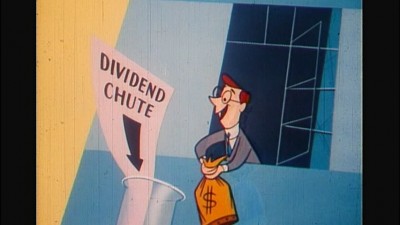
One probable reason that longtime documentary trouper James Sington's (In the Shadow of the Moon) 2010 film The Flaw has not received greater attention is that it tells very much the same story already put forth in Michael Moore's splashier, more dramatic, and more sensational Capitalism: A Love Story, a film that beat it to the punch in responding to the 2008 financial meltdown with an unflinchingly critical look at some long-held (and, as it turns out, wrongheaded) economic presumptions. But in documentary, as in fiction films, it's not so much what the story is as the way that it's told that makes the biggest difference, and Sington has come up with an approach that's something like the yin to Moore's yang, treading the same investigative path, arriving at much the same conclusions, but delivering his findings with a tone that makes The Flaw equally interesting to (if perhaps less funny, harsh, emotional, and viscerally enraging than) its earlier, more agitation-minded counterpart.
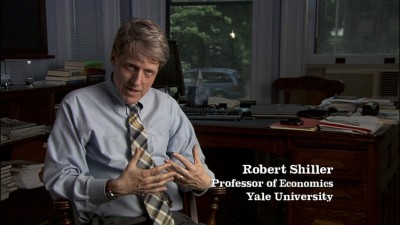
As the frame for the film's guided tour through decades of U.S. economic history, Sington brings in Andrew Luan, a literal tour guide and former dot-com worker and bond trader (and thus survivor of two bubbles that went the way of all bubbles) who takes visitors to New York around Wall Street for a direct look at the chamber of horrors whose ripple effects have spread into practically all corners of American life. From Luan, the film springboards back into a an old-fashioned, Eisenhower-era classroom cartoon short explaining the history of American capitalism and the way free markets work to everyone's benefit. With the aid of statistics, graphs, and, most importantly, the input of qualified, well-studied, informed experts (economic academics like Yale's Robert Shiller, Harvard's Louis Hyman, Nobel-winning economist Joseph Stiglitz, and Robert Wade of The London School of Economics, among others) and voices from the trenches (including a Queens woman who can't get her bad loan modified, an overextended Florida real-estate investor, and New York Times economic reporter Ed Andrews, who, ironically, is in danger of losing his house to foreclosure), all of whom do their part in pinpointing what went wrong to bring about the indebtedness, reckless speculation, and (intimately connected) yawning income-disparity chasm that together formed the toxic economic scenario that came to a head in '08, which we're still suffering through. What it all amounts to is a veritable arsenal of support, both empirical and deeply researched, for the idea that consumer capitalism is, indeed, the best, freest, most widely beneficial system so long as everyone can afford to consume without bankrupting themselves, and the income needed to consume isn't concentrated into a tiny sector of the population (one whose wealth goes into self-perpetuating more wealth, not consumption) that exponentially expands its own prosperity by hoarding while the vast majority goes broke by buying goods and services, i.e., simply doing what everyone is encouraged to do in a consumer society.
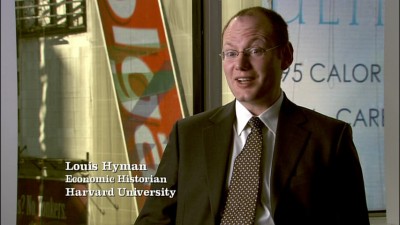
Sington includes some footage of former Federal Reserve Chairman Alan Greenspan, brought before Congress in the wake of the '08 meltdown, from which the film's title is derived: the "efficient markets" theory by which Greenspan operated the nation's financial lighthouse -- the same theory whose political Pandora's-box legacy from the Reagan/Thatcher years we're still inundated with -- has, Greenspan himself admits, a deep, possibly terminal flaw in its foundational assumption that markets are all-wise and will always correct themselves, so everyone is free and prosperous, or would be if only the big, bad government would keep its paws off. The Flaw does an excellent job of pointing up the delusional naiveté of that thinking, which even Greenspan, to his surprise and humbled dismay, has to acknowledge: there is no such thing as a market "free" of government manipulation, since it's clear that government deregulation that favors the financial/corporate sector has strong effects -- the gross income inequality we see today -- just as a more equitable effect could be achieved through progressive income taxation and other regulatory, market-correcting measures. The "absence" of government in economic affairs is an illusion; the only question is, will the government's unavoidable pull and power in economic matters be used to make the rich ever richer or provide more people with more chances to turn their hard work into actual prosperity?
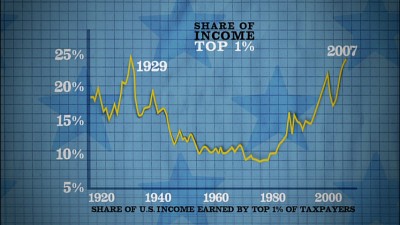
It is perhaps in their use of purposely anachronistic footage that the different feels of The Flaw and Capitalism: A Love Story can best be discerned: Moore's crude but effective (and not off the mark) montage/voiceover contrasts the vapidity of old movies and instructional/propaganda shorts to totally undermine them, while Sington's approach is more nuanced: the little cartoon shoppers, salesmen, and bankers in the clip he's using were acting in good faith and in accordance with the reality of their less economically unequal time, the film seems to be saying; now let us explain to you, step by step and based on solid information, how profoundly that reality has changed to complicate any pre-1980 understanding of how capitalism works into unrecognizability and irrelevance. (Speaking of nuance, there are surely viewers out there who would be receptive to at least considering the ideas presented in The Flaw but who don't care for Moore's tendency to insert his often faux-naïve personality into the proceedings; here, the director remains safely behind the camera.) It's actually the perfect film to watch after being galvanized by films like Moore, or Enron: The Smartest Guys in the Room, or Inside Job, etc. If those films open your eyes to an American class crisis that's been a long time coming and give you some infuriating clues as to who and what's responsible, The Flaw goes one step further, offering a calm, long-view analysis of what went wrong and an in-depth accounting of the incorrect, dangerous assumptions about people and money that got us there, as well as a potential scenario (as in the New Deal's bold attempted correction, in the Depression, of the out-of-control, underregulated capitalism of the '20s -- the kind of step we've so far failed to take in our own current burst bubble) in which the economic system actually serves and works for the people living with and laboring in it, and not the other way around.
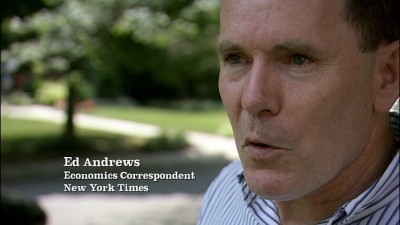
THE DVD:
Presented in a widescreen/anamorphic transfer at an aspect ratio of 1.78:1, the film's mostly digital video-originated images are sharp, clear, thoroughly correct and vivid across the color spectrum, and generally unimpeachable, with no aliasing, edge enhancement, or other transfer/authoring gaffes or compression artifacts.
Sound:The film's Dolby Digital 2.0 stereo soundtrack comes through perfectly on the disc, with full clarity, depth, and fullness, and with no distortion or imbalance whatsoever.
Extras:A 48-minute Q&A with director David Sington, a seasoned and down-to-earth filmmaking personality who discusses in good detail how he came from focusing mainly on scientific subjects in his work to The Flaw's socioeconomic/political one, so far outside his purview; some of his general principles of filmmaking (he insists that it's in the editing, not the shooting, that a documentary is made); and his specific strategies and choices when it came to organizing the various experts and storytelling devices in The Flaw. There's also a very brief onscreen-text director bio and a quartet of trailers for other Docurama Films releases.
FINAL THOUGHTS:A calm, rational, and thoughtful investigation of a true story that could easily blind you with rage -- the history of starry-eyed economic ideas that led to radical deregulation and our current widespread financial woes -- The Flaw is the most cerebral and academic-minded of what has become a documentary subgenre unto itself: the recession-era exposé of negligent economic policy and financial (mal)practice (Capitalism: A Love Story, Inside Job, etc.). But director David Sington and the experts he's rounded up are consistently well-organized and plainspoken on the matter, explaining in an informative but accessible, entertaining way the philosophical/political wishful thinking and convoluted Wall Street scheming that worked in tandem to freeze middle class prosperity and lead us into our current, seemingly endless stretch of economic desert. The Flaw is the most lucid revelation yet of how the nightmare economic scenario we're all still living through came to be; in giving us perhaps the deepest, most systematic, and most careful cinematic investigation of the financial crisis yet, it shines with a reason and rationality that suggest a light at the end of a very long tunnel so long as we can get ourselves onto the path (a route toward which something like The Flaw is a significant step) of actually learning from our mistakes. Highly Recommended.
|
| Popular Reviews |
| Sponsored Links |
|
|
| Sponsored Links |
|
|
| Release List | Reviews | Shop | Newsletter | Forum | DVD Giveaways | Blu-Ray | Advertise |
|
Copyright 2024 DVDTalk.com All Rights Reserved. Legal Info, Privacy Policy, Terms of Use,
Manage Preferences,
Your Privacy Choices | |||||||












